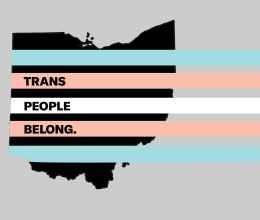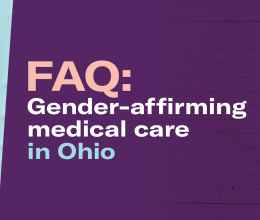Thank you, Director Cornyn and staff of the Ohio Department of Mental Health and Addiction Services (OMHAS), for allowing me to provide testimony today regarding the revised draft rules up for consideration. My name is Sean McCann, and I serve as a Policy Strategist for the American Civil Liberties Union (ACLU) of Ohio.
Founded in 1920, the ACLU works in the courts, legislatures, and communities to defend and preserve the individual rights and liberties guaranteed to all people in this country by the Constitution and laws of the United States. The ACLU includes more than 500,000 members in all 50 states, making it our country’s foremost advocate of individual rights. As an affiliate of the ACLU, the ACLU of Ohio has 28,000 members and supporters statewide, and in every county. The ACLU of Ohio appears routinely in state and federal courts and the legislature to defend civil rights and advance the civil liberties of all people.
Together, we work to ensure that all LGBTQ people can live openly without discrimination and enjoy equal rights, personal autonomy, and freedom of expression and association. For decades we have represented transgender minors and adults in federal and state courts across the country. Specifically, we have challenged restrictions on the ability of transgender people to access medically necessary, evidence-based health care and know not only the grave harm such restrictions cause the transgender community, but also the erosion of
fundamental legal protections these types of restrictions represent.
As we indicated previously in our February 14 public comment, we commend the Department for limiting the scope of these rules and for making other changes. The revised rules represent an improvement but continue to unnecessarily burden the ability of adolescents to access needed medical care. With that in mind, we again urge the Department to rescind draft proposed rules 5122-26-19 and 5122-14-12-1.
Additionally, we write with specific concerns regarding 5122-26-19 (D) and 5122-14-12-1 (E), the language reading as follows: “a provider that initiated care to a minor individual prior to the effective date of this rule is exempt from meeting the standards in paragraph … of this rule with respect to that individual.”
This section appears to create a legacy clause for minors who are already receiving gender affirming care from a specific provider. This is an important provision, but it does not provide sufficient clarity. Many patients must change providers because the provider leaves the state, or the patient relocates within the state, or the patient needs to move from one specialist to another. As drafted, the rule may cause disruptions of care that would be deeply harmful to adolescents currently reliant on a treatment plan. We suggest revising this section of the rule to include more explicitly a provision on the continuation of care from another provider. For example, “A provider who initiated care to a minor individual or who treats a minor individual whose care was initiated by another provider prior to the effective date of this rule is exempt from meeting the standards in paragraph…of this rule with respect to that individual.”
Moreover, we remain concerned about the vagueness of sections 5122-26-19 (B)(3)(c) and 5122-14-12-1 (C)(3)(c), discussing the comprehensive, multidisciplinary care plan: “a detailed plan of action for individuals seeking to detransition.” A lack of consensus exists regarding factors that constitute detransition. We are concerned that this section may conflate individuals who detransition by identifying with their birth sex with individuals who pause or discontinue aspects of medical treatment but maintain a transgender identity.
At best, these rules are unnecessary and will cause undue burden to providers of care. At worst, they will prevent transgender, gender-nonconforming, and intersex (TGNCI) young people from readily accessing care they previously received. For these reasons, we believe rescinding these rules is the clearest way the state can protect the health and well-being of all Ohioans.
There are widely accepted clinical guidelines governing this area of health—standards set by doctors and other medical professionals—that help ensure transgender people get the highest levels of age-appropriate care possible. Treatment of transgender individuals with gender dysphoria is governed by the World Professional Association for Transgender Health’s Standards of Care, now in its eighth edition, and the Endocrine Society’s Clinical Practice Guideline. The treatment protocols for treating gender dysphoria outlined in these guidelines are recognized and accepted by every major medical association in the United States.
The proposed rules, even in this revised form, bear no resemblance to these existing medical guidelines. What’s more, they deliberately continue the practice of nonconsenting surgeries on intersex populations.
We also ask you to pause and consider the unthinkable turmoil the TGNCI community has endured over these last few years, as a national movement to strip them of their rights has surged at every level of government, particularly in state legislatures.
Community members, providers, their families, and allies have shown up countless times just across the street at the Statehouse to urge lawmakers not to pass the several pieces of legislation targeting the TGNCI community. Beyond that, they have had to defend themselves and their livelihoods at the State Board of Education, their local school boards, and elsewhere. As you know, these attacks came to a head with the recent enactment of House Bill (HB) 68 over the Governor’s objections, on the heels of his announcing these very rules.
It is no exaggeration to say that some families already have moved and many others are seriously considering leaving Ohio. The 2022 U.S. Transgender Survey Early Insights report1 lists Ohio as one of the 10 states most frequently cited by respondents who have moved or are considering moving from their state due to discrimination, unequal treatment, or pending legislation.
We urge you to use your authority to lighten the load on TGNCI young people and rescind these proposed rules. These youth, their families, and their doctors are experts in determining which courses of treatment, if any, are appropriate, based on their unique medical needs. They deserve the same right we all possess to make their own health care decisions, free from government-imposed obstacles.
Thank you for the opportunity to provide testimony on revised Draft Proposed Rules 5122-26-19 and 5122-14-12-1. If you have any questions, please do not hesitate to contact me. At this time, I would be happy to take any questions or provide additional information.
1James, Sandy E, et al. “Early Insights.” Early Insights: A Report of the 2022 U.S. Transgender Survey, National Center for Transgender Equality, Feb. 2024, https://transequality.org/sites/default/files/2024-02/2022%20USTS%20Earl...







